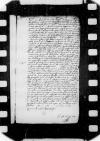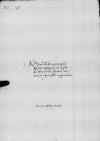Letter #1841
Ioannes DANTISCUS to Tiedemann GIESEHeilsberg (Lidzbark Warmiński), 1538-03-22
English register:
Dantiscus is happy about his friendly relations with Giese and expresses satisfaction with how Felix [Reich] mediates in matters between them.
The letter Dantiscus was sent by Giese is a letter from Cracow from Georg Hegel about private matters and purchases requested by Dantiscus; Dantiscus assures Giese that Hegel will send a horseback messenger as soon as the package from Rome arrives.
The Provost [Paweł Płotowski] claims that he heard in Piotrków that the confirmations have been arranged already, and Dantiscus trusts this was not a lie. He also hopes the Bishop of Cracow [Jan Chojeński] is doing better than [Johann von] Werden writes. He thinks the news communicated by the Bishop of Linköping [Hans Brask] about the Pope [Paul III] is true, since he was already infirm as a cardinal.
As regards the proceedings concerning the custodianship, he agrees with Giese’s opinion, he cannot see a worthier person than he recommended earlier; he hopes Heinrich [Snellenberg] refrains from any action until his arrival.
The cook is good at his art, but he is married and comes from Lithuania, and Lithuanians are strange.
The other matters concerning the Provost will be conveyed by Felix [Reich].
Dantiscus will send the letter to [Wojciech] Kijewski with the other letters.
| received 1538-03-23 Manuscript sources:
Prints:
| ||||||
Text & apparatus & commentaryPlain textText & commentaryText & apparatus
Reverendissimo Domino
Reverendissime mi Domine, frater et amice carissime et honoran(de) or honoran(dissime)⌈honoran(de)honoran(de) or honoran(dissime)⌉.
Salutem et fraterni mei amoris commendationem plurimam.
Quod adeo diligenter et tanto favore venerabilis coamicus noster, dominus
cf.
Spero meliora quam ea, quae communis amicus noster, dominus
De
cf.
De
Reliquum, quia ad prandium avocor, quod praepositum contingit, Dominatio Vestra Reverendissima a domino
Ex
Reverendissimae Dominationis Vestrae integerrimus frater


 BCz, 245, p. 20
BCz, 245, p. 20